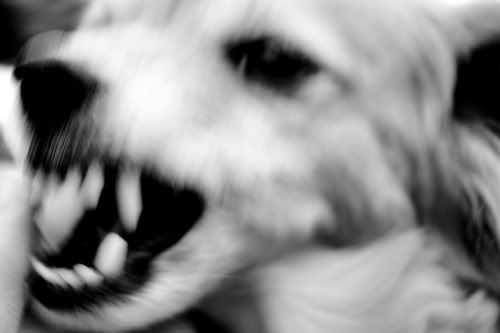Above: Bad pet behavior is never acceptable but lots of people tolerate it–or reinforce it!
It is time for another of my rants on pet behavior…you have been warned!
Since when is okay for a pet to be poorly behaved?
There is a disturbing trend spreading across the United States among the pet owning population–it is one that allows bad behavior, including aggression.
Case in point, did you see the video of the dog that was allowed to hump a woman?
It not only was broadcast on the Internet but also on television!
An idiot filmed the entire event without taking action to prevent the incident–nor did anyone stop the dog from behaving badly.
The woman went down to prevent a fall and the dog continued.
People thought it was funny and the comments were just as stupid and shameful.
Contrary to the belief of most people, dog humping behavior usually has nothing to do with sex.
The fact that a dog that exhibited this behavior was allowed to engage in the behavior was inexcusable because it was predictable and preventable!
In the list of bad behaviors pets are allowed:
- nosing the crotch of people,
- pawing,
- jumping on people or animals,
- lunging on the leash,
- growling,
- excessive barking,
- etc.
For some reason people excuse these behaviors stating, “It’s okay” when it is absolutely not okay.
Flashback to an aggression seminar I attended almost twenty years ago where the “worst” dogs were brought in to show how behavior could be prevented or extinguished.
There was a woman with a poorly behaved Dachshund who lunged and growled anytime anyone came near the dog or the owner.
Want to know why it did?
Because every time it exhibited bad behavior the woman gave it a toy or petted it.
Yep, she rewarded the aggression each and every time.
People do that with pets that behave poorly in public too.
They reward the bad behavior and do nothing to teach the animal how to behave.
A whole group of people are failing miserably at animal behavior training for better pet behavior in the home and in public.
Ask any vet how many people tell their dog that he or she is good when it growls at the veterinarian or veterinary staff during an exam–you’ll be surprised at the answer because it is pretty common.
The same thing happens when pets nip and you hear, “Oh, it is okay–it is only a puppy!”
Wrong, wrong, wrong.
Allowing bad pet behavior teaches bad pet behavior.
Later, everyone begins to complain as the animal ages and gets bigger.
In the worst situations, those pets land up in the animal shelter for behavior problems that were actually allowed, taught or reinforced by the pet owners.
Back to the people who allow their pet to growl in the pet professional’s office…I have one question for you, “Have you lost your mind?”
When is that ever okay?
If it happens there I am sure it happens a lot of other places–and I see a bit neon light flashing about your head that says, l-i-a-b-i-l-i-t-y!
It isn’t just the average pet owner with the problem either.
Last year I declined getting involved in a project that was supposed to take the place of a few programs I used to offer in my region.
I did not want to be affiliated with the people involved nor did I want my name (or reputation) associated with the crew.
Fast forward a year later and I hear about all the “near miss” and actual incidents that have occurred between pets and people at the venue.
In all my years of managing pet groups I mitigated and prevented such events due to diligence, rules, and education of those participating.
Instead, this new group has been essentially perpetuating a free-for-all environment similar to the dog parks gone wild model.
People, it is time to take action to make sure you reinforce good pet behavior and to stop tolerating and accepting bad behavior.
Yes, it takes work but failure to work at good behavior means that your life and the life of your pet is limited and often miserable.
Don’t know what to do? Find help via the resource page or make sure you get access to the front of the line of the pet parenting school.
Have a comment or a story? Add it to the comments below.


